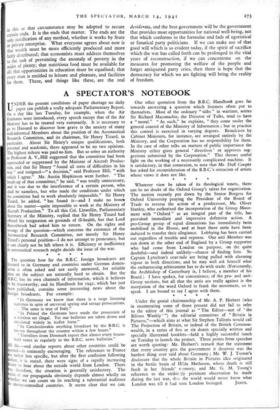The question how far the B.B.C. foreign broadcasts are listened
to in Germany and countries under German domin- ation is often asked and not easily answered, for reliable data on the subject are naturally hard to obtain. But the B.B.C. has its own channels of information, which it believes o be trustworthy, and its Handbook for 1941, which has just been published, contains some interesting news about the foreign broadcasts. For example:
" In Germany we know that there is a large listening audience in spite of universal spying and savage prosecutions.
• .. The same is true of Italy."
" In Poland the Germans have made the possession of a wireless set illegal. Yet our bulletins are taken down and circulated widely in leaflet form."
" In Czechoslovakia anything broadcast by the B.B.C. is known throughout the country within a few hours."
" Travellers from Denmark report that almost every house- hold tunes in regularly to the B.B.C. news bulletins."
11 this—and similar reports about other countries could be uoted—is eminently encouraging. The references to France e rather less specific, but after the first confusion following efeat, it is stated, there were signs of a rapidly increasing esire to hear about the outside world from London. There therefore, the situation is generally satisfactory. The alue of our propaganda obviously depends almost wholly on llether we can count on its reaching a substantial audience enemy-controlled countries. It seems clear that we can. One other quotation from the B.B.C. Handbook goes far towards answering a question which listeners often put to themselves. Most of the ordinary " talks " in wartime, writes Sir Richard Maconachie, the Director of Talks, tend to have a " moral." " As such," he explains, " they come under the general control of the Ministry of Information ; but in practice this control is exercised in varying degrees. Broadcasts by Cabinet Ministers, for instance, are arranged entirely by the Ministry, and the Corporation has no responsibility for them. In the case of other talks on matters of public importance the Ministry either gives general ' directives ' or approves sug- gestions submitted by the Corporation." This throws useful light on the working of a necessarily complicated machine. It is satisfactory, in that connexion, to note that Mr. Duff Cooper has asked for reconsideration of the B.B.C.'s ostracism of artists whose views it does not like.






























 Previous page
Previous page